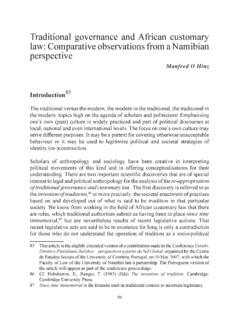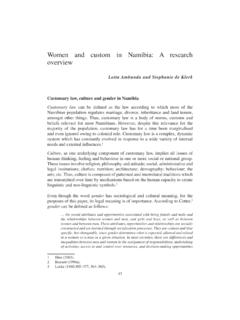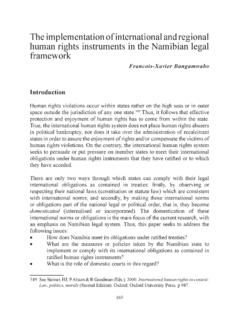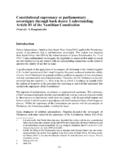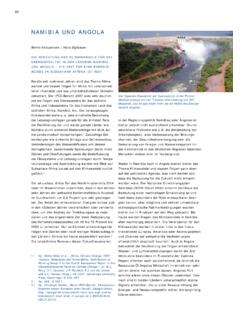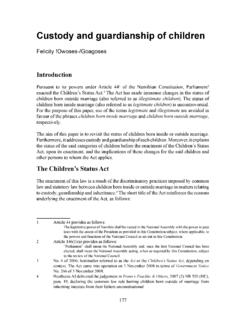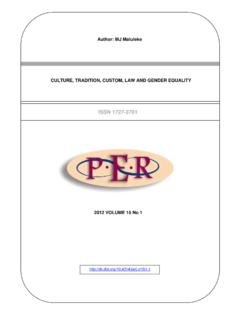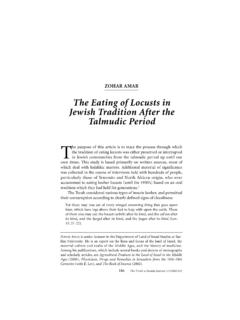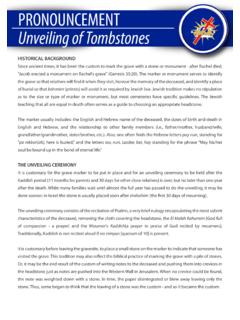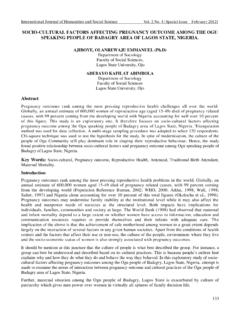Transcription of Women and law reform in Namibia – Recent …
1 107 Women and law reform in Namibia Recent developmentsTousy NamisebAll human beings are born free and equal in dignity and rights. They are endowed with reason and conscience and should act towards one another in a spirit of brotherhood ..1 The Universal Declaration of Human Rights sets the standards appropriately and Women should enjoy this status, being equal to their male counterparts in dignity and rights. The African Charter on Human and Peoples Rights echoes the sentiment of equality between men and Women :2 Every individual should be entitled to the enjoyment of the rights and freedoms recognized and guaranteed in the present Charter without distinction of any kind such as race, ethnic group, colour, UsexU, language, religion, political or any other opinion, national and social origin, fortune, birth or other status.
2 [Emphasis added]Despite the standard-setting international, regional and domestic legal instruments, the position of Women in Namibian society remains a challenge. The struggle for the emancipation of Women was fought alongside Namibia s liberation struggle. At independence, Namibia adopted a Constitution which recognises the inherent dignity and the equal and inalienable rights of all members of the human family. Article 10 of the Constitution of the Republic of Namibia specifi cally provides as follows:(1) All persons shall be equal before the law.(2) No persons may be discriminated against on the grounds of UsexU, race, colour, ethnic origin, religion, creed or social or economic status.
3 [Emphasis added]The specifi c challenges for the status of Namibian Women are embodied in the common, statutory and customary law. The Namibian Constitution provides for the equality of men and Women , but all these provisions need to fi nd practical reality, as Kamba puts it:31 Article 1, Universal Declaration of Human Article 2, African Charter on Human and Peoples Kamba (1995). Women and law reform in Namibia Recent developments 108[T]he constitution is a dry document and what breathes life into it is human interaction, giving rise to issues or disputes concerning human rights. [It] becomes alive through its interpretation by judges and its application in real-life , although the Constitution provides for broad equality for men and Women , there is no specifi c provision to uplift Women .
4 One might be tempted to compare this with the provision relating to children s rights, which goes into great The question is whether there is a need for further legal intervention to protect Women s rights more effectively. There are some that are for further legislative intervention, and others that are against it. This dilemma is illustrated by Albertyn and Kentridge, as follows:5 Formal equality presupposes that all persons are equal bearers of right; it ignores actual social and economic disparities between groups and individuals and constructs standards which appear to be neutral, but which in truth embody a set of particular needs and experiences which derive for socially privileged groups.
5 So a reliance on formal equality may exacerbate inequality. Substantive equality, on the other hand, requires an examination of the actual social and economic conditions of groups and individuals in order to determine whether the Constitution s commitment to equality is being upheld. Such an inquiry reveals a world of systemic and pervasive group-based inequalities which need to be taken into account in the formulation of legal approaches to equality is in line with the realisation of a lack of substantive equality that a proactive approach is necessary. The Namibian government has committed itself to the upliftment of Women in general, and of black Women in particular.
6 This can be seen from various legislative interventions6 as well as the illustrated political will, of which the establishment of the Ministry of Gender Equality and Child Welfare alone speaks specifi c challenges for Women s rights can be seen in the sphere of employment relations, the family set-up, customary law, violence against 4 Article 15 of the Namibian Constitution provides at length for the protection of children, but Women s rights are not dealt with in a similar Albertyn & Kentridge (1994:149). 6 A number of laws have been passed since independence to deal with the position of Women . These include the Affi rmative Action (Employment) Act, 1998 (No 29 of 1998), the Combating of Rape Act, 2000 (No.)
7 8 of 2000), and the Married Persons Equality Act, 1996 (No 1 of 1996).7 The Department of Women Affairs in the Offi ce of the President was upgraded into a full-fl edged Ministry, in order to take a more proactive approach towards gender-orientated law reform . Women and law reform in Namibia Recent developments 109women, and access to These particular challenges have been approached systematically by government, including by way of law its inception, the Law reform and development Commission has embarked on a number of research projects that have a bearing on the rights of Women . As far as the woman s place in the family is concerned, the following are relevant: Succession and Estates Project Divorce Project Customary Law Marriages Project Domestic Violence Project, and Cohabitation Succession and Estates Project tackles serious and complex issues.
8 The issues are complex because they deal with personal law as opposed to public law. Furthermore, special care needs to be taken to avoid imposing alien sets of norms or rules on certain individuals or history of this problem can be traced to common law and various statutes. The Native Administration Proclamation9 allowed the use of various customary laws in matters pertaining to succession. However, the ascertainability of customary laws remains a problem, and some customs are being abused because the contents of a particular customary law are at times not Intestate Succession Ordinance10 amplifi ed and amended the applicable Roman Dutch common law by declaring the surviving spouse a possible heir.
9 Two confl icting systems have since been in use, but most black Women could not inherit due to the specifi c rules of their customary laws. The abuse of some of the latter laws remains a problem, and property grabbing from widows by their deceased husband s relatives is rampant in some communities. There is a clear need to protect such vulnerable Women through law other system which is based on common law and the Intestate Succession Ordinance provides for a surviving spouse to inherit alongside the descendants 8 The Agricultural (Commercial) Land reform Act, 1995 (No. 6 of 1995) deals with land redistribution. The Land reform Advisory Commission established by the Act has developed criteria for land distribution, which among other things, advance Women s access to agricultural land.
10 9 Proclamation 15 of 1928. Some provisions of the Proclamation have since been repealed as they were found to be in confl ict with the Ordinance 12 of 1946. Women and law reform in Namibia Recent developments 110of their deceased husband. This inheritance system affords more protection to a surviving widow, compared with widows who are subject to customary laws which bar Women from challenge is how to reconcile the two systems. Following research and consultations over the past few years, it has become evident that more protection needs to be extended to widows, whilst simultaneously giving effect to the following constitutional provision:11 Every person shall be entitled to enjoy, practise, profess, maintain and promote any UcultureU, language, UtraditionU or religion subject to the terms of the Constitution and further subject to the condition that the rights protected by this Article do not impinge upon the rights of others or the national interest.
